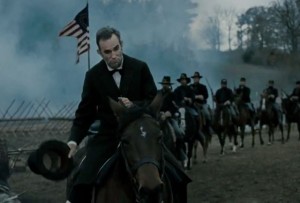So I saw “Lincoln” last night. I typically hate the saccharine sweetness of Steven Speilberg and the everything’s-gonna-be-alright history lessons. ET phone home already. It makes teaching his movies–Amistad, Schindler’s List–difficult without having to do a lot of unteaching. But hey, it’s Hollywood.
Toward that end, I’ve found a few sources helpful for those of us in the classroom. My sense: it’s a good but flawed movie that misses it’s own main point (the passage of the Thirteenth Amendment). The inclusion of Thaddeus Stevens getting into bed with his maid/lover Lydia toward the end has no basis in historical fact and, while fine on a principled level, shows no historical awareness and indeed falls back into the tradition first malevolent promulgated by DW Griffith in “Birth of a Nation.”
But anyway:
- This fact-versus-fiction catalogue from slate.com is really good, if a bit thin. But it gets a lot right.
- Historian Corey Robin has an excellent post with many interesting links, and he basically agrees with my reading of the movie–that the movie doesn’t really tell the story of “Lincoln” but instead the story of the passage of the Thirteenth Amendment, and had Speilberg and screenwriter Tony Kushner remember that fact, they would have made a much better movie, one that wouldn’t have had the awful ending and would have included the story of African Americans who were demanding to be heard. Sometimes less-is-better, and, like all of us who have written books and articles well know, we’ve got to fight the urge to reveal everything we know. I wish Kushner would have listened.
- Lincoln scholar (and “Lincoln” consultant) Harold Holzer holds court at the Daily Beast, finding many basic, not-terribly important errors, although ones that make the movie cringe-worthy, such as the implausible laughable opening scene when a collection of 18-year-old soldiers recite, line-by-line, the Gettysburg Address (oy).
- Aaron Bady over at Jacobin reads the movie as a tale of our times, about Obama as compromiser-in-chief, and as a tale of uplift that misses the whole final chapter of Reconstruction, which was the systematic and ultimately successful attempt of the South to lose the war but win the peace, thus leading to the Jim Crow era whose shadow still permeates.
- Louis Masur offers a far more sympathetic account of the movie in the Chronicle of Higher Education, but places it in the historiography, as a piece of Lincoln reconstruction after the cut-downs of Lincoln as placid Negrophobe who acted only out of war necessity.
- Eric Foner posted a nice informative response to David Brooks’ silly column about the movie that succinctly fleshes out some of the larger historical problems with the film.
- James MacPherson added this basic Q&A in the LA Times.
That’s a start. What else have you found useful?
And special thanks to friend-of-blog Tim Lacy for bringing the Robin piece to my attention and to generally piquing my interest. (If you compile your facebook posts somewhere, let me know and I’ll post those too.) UPDATE: he has.





Kevin,
Thanks for the shout out. Here are two posts where I lay out my initial reactions to the film (in the form of questions), as well as summarize and emend both Corey Robin and Aaron Bady’s long reviews.
– Tim
Very good website you have here but I was wondering if you
knew of any forums that cover the same topics talked about
here? I’d really like to be a part of group where I can get suggestions from other experienced individuals that share the same interest. If you have any suggestions, please let me know. Bless you!
Feel free to visit my web blog :: how to make a app
Thanks For Blog 🙂
I’ve waited to see the movie. It has more to do with time and chores than anything else, but I like your analysis and the links you suggest.